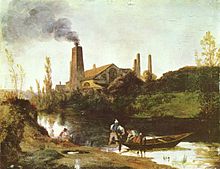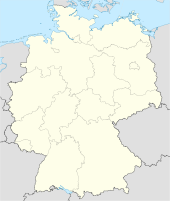- Eberswalde
-
For the Mars crater, see Eberswalde (crater).
Eberswalde 
Coordinates 52°49′59″N 13°49′59″E / 52.83306°N 13.83306°ECoordinates: 52°49′59″N 13°49′59″E / 52.83306°N 13.83306°E Administration Country Germany State Brandenburg District Barnim Town subdivisions 7 Ortsteile Mayor Friedhelm Boginski (FDP) Basic statistics Area 58.17 km2 (22.46 sq mi) Elevation 25 m (82 ft) Population 40,944 (31 December 2010)[1] - Density 704 /km2 (1,823 /sq mi) Other information Time zone CET/CEST (UTC+1/+2) Licence plate BAR (früher EW) Postal codes 16225/16227 Area code 03334 Website www.eberswalde.de Eberswalde (German pronunciation: [ˌʔeːbɐsˈvaldə]) is a major town and the administrative seat of the district Barnim in the German Federal State (Bundesland) of Brandenburg, about 50 km northeast of Berlin. Population 42144 (census in June 2005), geographical location 52°50′N 13°50′E / 52.833°N 13.833°E. The town is often called Waldstadt (forest town), because of the large forests around it, including the Schorfheide-Chorin Biosphere Reserve. Despite this fact, Eberswalde was an important industrial center until the German Reunification.
Contents
History
 Steel-mill near Eberswalde, Carl Blechen, c. 1830.
Steel-mill near Eberswalde, Carl Blechen, c. 1830.
The area around Eberswalde was already populated in Paleolithic. Before the establishment of the Margraviate of Brandenburg it was the place of a Slavic stockade. The Treasure of Eberswalde, the largest pre-Christian gold treasure from the area of today's Germany was found here. Today the treasure is located in the Pushkin Museum in Moscow.
The town of Everswolde ("forest of the boars") was established in 1254 by the Ascanian margrave Johann I. It was first mentioned in a document dated April 23, 1276 when margrave Albrecht III. resided there. In 1300 it got market rights. From the year 1317 the main trade route between Stettin and Frankfurt (Oder) went through the city. A major fire struck the city in 1499.
After rebuilding the town, Eberswalde became the first industrial town of the Margraviate of Brandenburg, with huge metallurgy capacities. Some parts of the town are still named from their past function, like Kupferhammer ("copper hammer"). 1605 till 1620 the important waterway Finow Canal was built.
During the Thirty Years' War Eberswalde has been besieged and conquered several times by nearly every important faction of the war. The general of the Catholic League, Albrecht von Wallenstein, resided in the town, later Gustavus Adolphus of Sweden, who did not survive the battle of Lützen, was embalmed in the town's Maria Magdalena church. Both parties forced the town population to support their troops. After the end of the war only twenty inhabitants of Eberswalde were yet alive, and Eberswalde needed more than a century to recover from its losses.
Between 1743 and 1755 120 families of smithes and metallurgic crafters moved from Thuringia and the Rhineland to Eberswalde. The steam boilers of the first German steam engines were made here. During the 19th century large factories were built in the area of Eberswalde, especially along the Finow Canal. On November 23, 1877 the first German telephone line was established here.
Eberswalde takes an important position in the history of German radio, for example the world's first radio concert was broadcast from Eberswalde in 1923. Werner Forssmann received his 1956 Nobel Prize in Physiology or Medicine for his experiments with cathetering his own heart, made in Eberswalde in 1929.
In the 1938 pogroms, Eberswalde's synagogue was destroyed. During World War II, several factories employed forced labourers and inmates of the Ravensbrück concentration camp. At the end of the war, the town center was attacked by the German Luftwaffe, in an attempt to delay the Soviet advance.
In 1970 Eberswalde was united with the city of Finow under the name Eberswalde-Finow. In 1993 the name Eberswalde was restored.
Transport
Eberswalde has access to the federal highways (Bundesstraße) B 2 and B 167 and the highway (Autobahn) A 11-E28. Eberswalde station is located on the Berlin–Szczecin line that reached Eberswalde from Berlin in 1842. It is the starting point of the railway lines to Templin and Frankfurt (Oder) and the now-abandoned line to Finowfurt, the EFE or Eberswalde-Finowfurter-Eisenbahn.
The town and its industrial parks can also be accessed through the waterways Oder Havel Canal and Finow Canal. Eberswalde-Finow also has an airport, Flugplatz Finow. After the withdrawal of the Soviet Air Force on May 11, 1993 the airfield has been opened for public traffic.
Until 1940 the town maintained some trams, which have been replaced by the Eberswalde trolleybus system. Eberswalde, Solingen and Esslingen are the only German towns where trolleybuses are still in operation.
Infratil from Wellington, New Zealand is considering an investment into Finow Airfield.
Economy
While Eberswalde was renowned for its thriving heavy industry in the past, since the fall of the wall, it has fallen upon harder times. As the East German government fell, state support vanished, and factories had to suddenly compete with more efficient firms in the West. As a result, many factories in Eberswalde went under, and visitors can see the remnants of these abandoned plants across town. Like many East German towns, Eberswalde has since struggled with unemployment, and many have left the region in search of work elsewhere. Consequently, many of the huge Soviet-Bloc style apartment complexes in Eberswalde (most notably the Brandenburgisches Viertel) are becoming empty, and are slowly being razed.
Culture
Festivals
Carnival Compared to other towns of the region, Eberswalde has quite a huge Carnival society. It was brought to Eberswalde from Bavaria and from the Rhineland, both are standing for different Carnival traditions. That's why Carnival is celebrated in two independent festivals at the same time, they are called Karneval and Fasching.
Rock me Magdalena
Rock me Magdalena is a rock concert in the Maria Magdalena church of Eberswalde, taking place every December 25.
Filmfest Eberswalde
Since 2004 there is the annual Eberswalde Movie Festival for Independent Film and Documentaries.
Culinary traditions
There are some foods that are associated with Eberswalde. The most important of them are Eberswalder Spritzkuchen (a special pastry that was invented 1832 in Eberswalde) and Eberswalder Würstchen (sausages).
Language
The tongue spoken in the region of Eberswalde is often called Eberswalder Kanaldeutsch (canal German). It is not an independent German dialect, but a very extreme mix of the Berlin Dialect and a bit of East Low German. Other forms of Kanaldeutsch, that are derived from the Eberswalde form, nearly developed back to the Berlin Dialect. That's why Eberswalder Kanaldeutsch is the only one that is in fact sometimes considered as an independent German dialect.
Gardens
The Forstbotanischer Garten Eberswalde is a historic botanical garden and arboretum.
Coat of arms
The emblem shows a green oak tree and above the oak tree a red eagle. Towards the oak's bole stand two black boars. The flag of Eberswalde is a black/white/green tricolour with the crest in the middle.
See also
References
- ^ "Bevölkerung im Land Brandenburg am am 30. Dezember 2010 nach amtsfreien Gemeinden, Ämtern und Gemeinden. Gebietsstand: 31.12.2010" (in German). Amt für Statistik Berlin-Brandenburg. 31 December 2010. http://www.statistik-berlin-brandenburg.de//Publikationen/OTab/2011/OT_A01-04-00_124_201012_BB.pdf.
External links
- Official website (German)
- http://www.eberswalde.biz
- http://www.eberswalde.tv
- Eberswalde at the Open Directory Project
Ahrensfelde | Althüttendorf | Bernau bei Berlin | Biesenthal | Breydin | Britz | Chorin | Eberswalde | Friedrichswalde | Hohenfinow | Joachimsthal | Liepe | Lunow-Stolzenhagen | Marienwerder | Melchow | Niederfinow | Oderberg | Panketal | Parsteinsee | Rüdnitz | Schorfheide | Sydower Fließ | Wandlitz | Werneuchen | ZiethenCategories:- Towns in Brandenburg
- Eberswalde
- Localities in Barnim
Wikimedia Foundation. 2010.





